CRM automation is revolutionising the way businesses engage with customers! Boost efficiency, enhance sales, and deliver personalised experiences with AI-driven solutions. Discover the game-changing benefits of automation across marketing, sales, and customer support. Ready to transform your business? Let’s dive in!
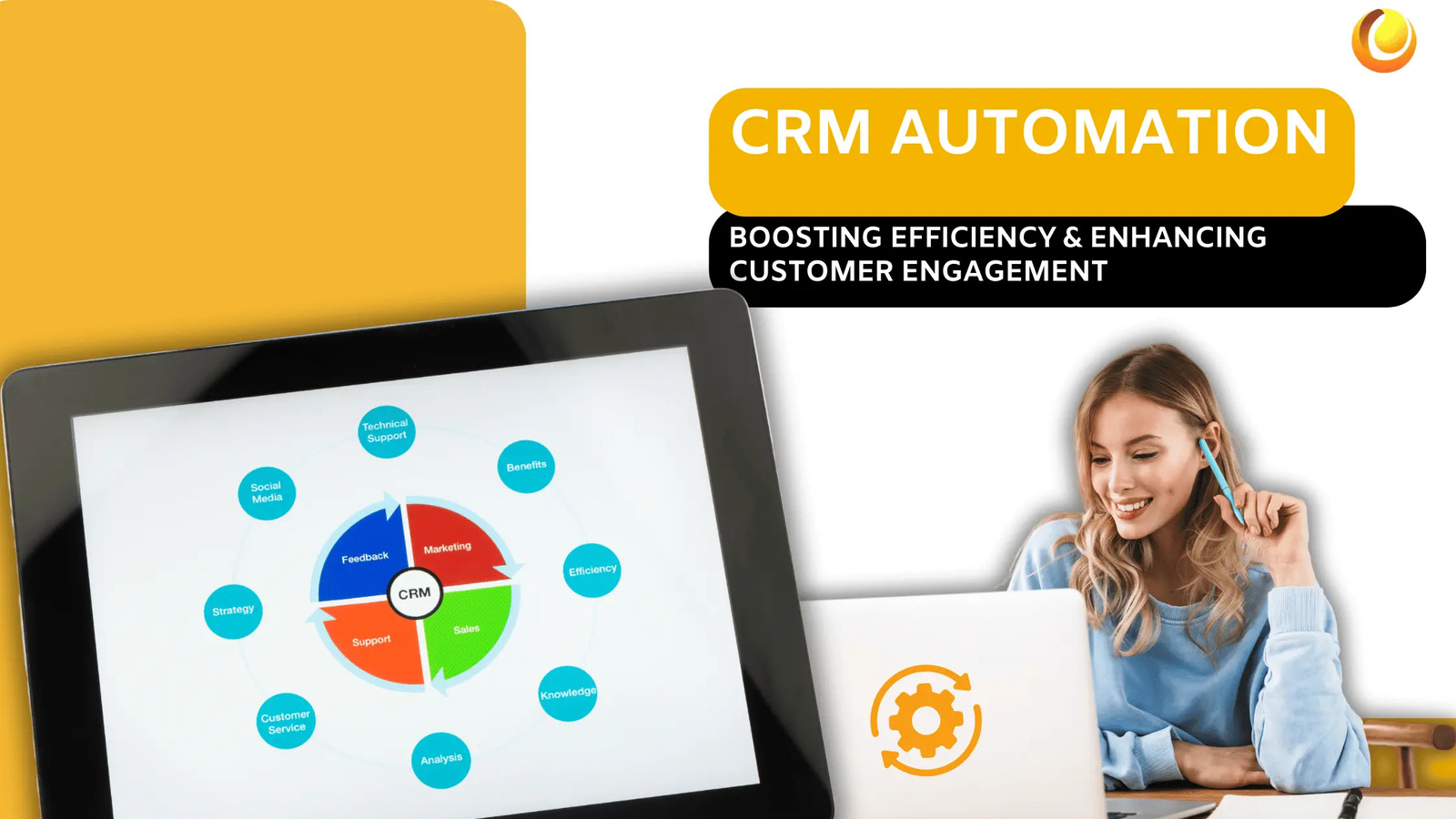
Introduction: The Power of CRM Automation
Do you know, that CRM automation has emerged as a game-changing solution, enabling businesses to streamline operations, enhance customer engagement, and drive revenue growth? By automating repetitive and time-consuming tasks, organisations can free up valuable resources, reduce human error, and focus on strategic initiatives that foster stronger customer relationships.
CRM automation is not just a technological convenience; it is a strategic necessity for businesses aiming to stay ahead of the curve. Automated workflows, AI-driven insights, and seamless integrations are transforming how companies interact with their customers, manage sales pipelines, and execute marketing campaigns. This article delves into the transformative power of CRM automation, exploring its benefits, key features, implementation best practices, and the future of this technology in shaping business success.
1. Understanding CRM Automation and Its Core Benefits
CRM automation refers to the use of software and technology to automate and optimise customer relationship management processes. It encompasses a wide range of functionalities, including data entry, lead scoring, email marketing, customer support, and sales pipeline management. By leveraging automation, you can ensure that every customer interaction is timely, relevant, and personalised.
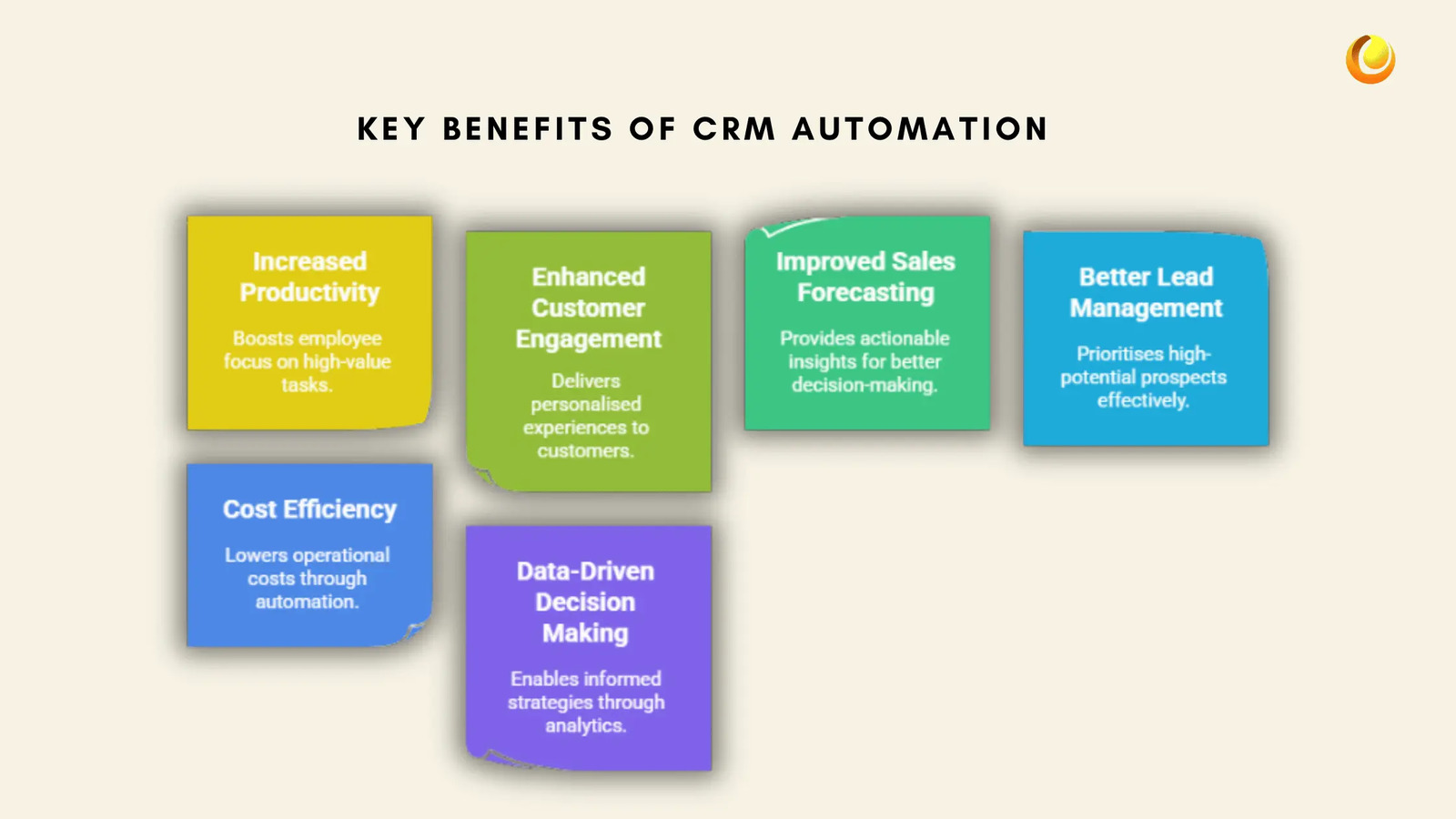
Key Benefits of CRM Automation
Increased Productivity: One of the most significant advantages of CRM automation is its boost in productivity. By automating mundane tasks such as data entry, appointment scheduling, and follow-ups, employees can focus on high-value activities like building relationships and closing deals. According to a study by Kixie, CRM automation can increase sales productivity by up to 29%.
Enhanced Customer Engagement: Automation enables businesses to deliver personalised experiences at scale. Automated email campaigns, AI-driven chatbots, and targeted messaging ensure that customers receive the right information at the right time, leading to higher satisfaction and retention rates.
Improved Sales Forecasting: CRM systems equipped with AI-powered analytics provide businesses with actionable insights into sales trends and customer behaviour. This allows for more accurate sales forecasting, better resource allocation, and informed decision-making. CRM users report a significant improvement in forecast accuracy.
Better Lead Management: Automation ensures that no lead falls through the cracks. By tracking and scoring leads based on their engagement levels, businesses can prioritise high-potential prospects and nurture them effectively, resulting in higher conversion rates.
Cost Efficiency: By reducing the need for manual intervention, CRM automation lowers operational costs and improves overall efficiency. Automated workflows minimise errors, reduce redundancies, and ensure that resources are utilised optimally.
Data-Driven Decision Making: CRM automation tools provide businesses with a wealth of data and analytics, enabling them to make informed decisions. From customer behaviour patterns to campaign performance metrics, these insights are invaluable for refining strategies and driving growth.
By integrating automation into their CRM systems, businesses can eliminate inefficiencies, enhance customer experiences, and achieve sustainable growth.
2. How does CRM Automation transform sales and Marketing?
CRM automation is revolutionising the way businesses approach sales and marketing. By automating key processes, companies can streamline operations, improve response times, and deliver more personalised experiences to their customers.
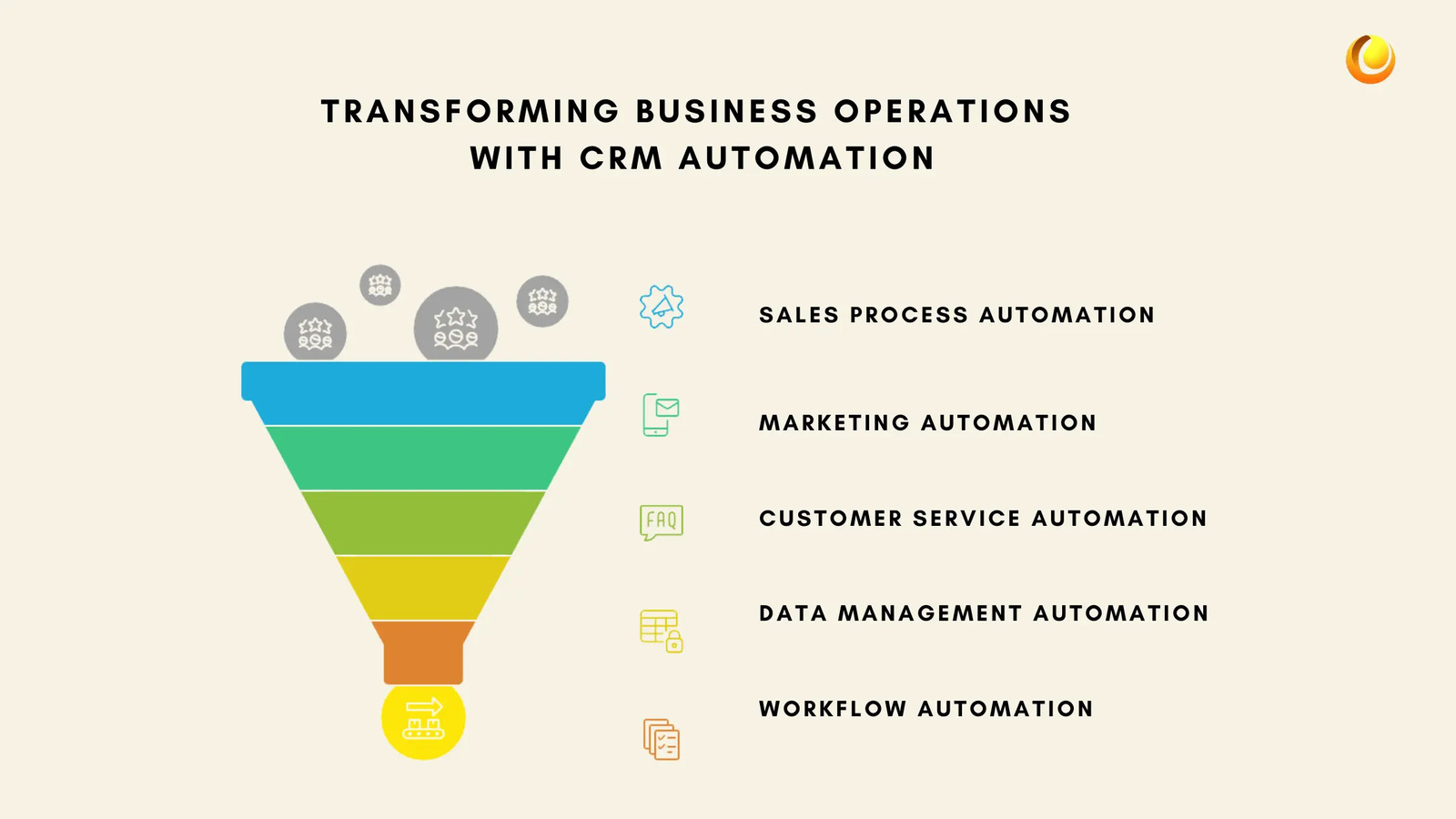
Sales Process Automation
Lead Scoring and Qualification: CRM systems analyse prospect behaviours and assign scores based on their level of engagement. This helps sales teams prioritise high-quality leads and focus their efforts on prospects most likely to convert.
Automated Follow-Ups: Automated reminders and responses ensure that no lead is left unattended. Whether it’s a follow-up email or a scheduled call, automation ensures timely and consistent communication.
Pipeline Management: Visual dashboards provide real-time updates on the status of deals, enabling sales teams to track progress, identify bottlenecks, and make data-driven decisions.
Task Automation: Routine tasks such as updating records, sending contracts, and scheduling meetings can be automated, allowing sales representatives to focus on building relationships and closing deals.
Marketing Automation
Personalised Email Campaigns: CRM automation tools enable businesses to create targeted email campaigns based on customer behaviour, preferences, and purchase history. Automated email sequences ensure that customers receive relevant content at every stage of their journey.
Social Media Integration: Many CRM platforms integrate with social media channels, allowing businesses to track engagement, schedule posts, and analyse performance metrics. This ensures a cohesive and consistent brand presence across all platforms.
A/B Testing and Analytics: Automation tools enable businesses to test different strategies and refine their campaigns based on data-driven insights. Iterative approaches like A/B testing, ensure continuous improvement and higher ROI.
Lead Nurturing: Automated workflows nurture leads through personalised content and timely follow-ups, guiding them through the sales funnel and increasing the likelihood of conversion.
By automating sales and marketing tasks, businesses can improve efficiency, enhance customer experiences, and drive higher revenue.
Customer Service Automation
Great customer service is all about speed and efficiency, and automation helps you stay ahead by handling routine tasks effortlessly. Here’s how:
Ticketing Systems: No more manually sorting through customer inquiries! With an automated CRM, support tickets are instantly assigned to the right team member, ensuring faster response times and smoother issue resolution.
Chatbots: Have you ever wished you could offer 24/7 customer support without hiring a round-the-clock team? AI chatbots such as Zobothandle FAQs, order tracking, and basic inquiries instantly. And for complex issues? They seamlessly pass customers to the right human agent, keeping the experience hassle-free.
Survey & Feedback Collection: Want real-time insights without chasing customers for feedback? Automated surveys pop up right after a support call or purchase, helping you gather valuable input to improve service—without lifting a finger.
Data Management Automation
Keeping customer data organised shouldn’t be a struggle. Automation takes care of the heavy lifting, so your team can focus on what matters.
Data Entry & Updates: Forget manual data entry errors—CRM tools automatically input and update customer details, keeping everything accurate and up to date.
Data Cleansing: Say goodbye to duplicate or outdated records! Automated systems clean up your database, ensuring you always have reliable information for better decision-making.
Reporting & Analytics: Need insights at a glance? Automated CRM dashboards generate real-time reports, giving you instant access to key performance metrics—no more digging through spreadsheets!
Workflow Automation
Repetitive tasks shouldn’t slow your team down. With workflow automation, your business runs like a well-oiled machine.
Task Assignment: No more wondering who’s handling what—CRM automation assigns tasks based on pre-set workflows, ensuring the right person tackles the right job at the right time.
Approval Processes: Whether it’s contract approvals or budget sign-offs, automated workflows ensure documents reach the right stakeholders quickly, cutting delays and keeping things moving.
Notifications & Alerts: Stay in the loop without constantly checking the CRM! Automated alerts let you know when a high-priority lead enters the pipeline or a deal reaches a critical stage, so you never miss an important update.
With these automation tools, you’ll work smarter, not harder—saving time, boosting efficiency, and delivering an even better customer experience. Now, let’s dive into the key benefits of CRM automation.
3. Key Features of CRM Automation Tools
Choosing the right CRM automation tool is critical for maximising efficiency and achieving business goals. Here are some essential features to look for:
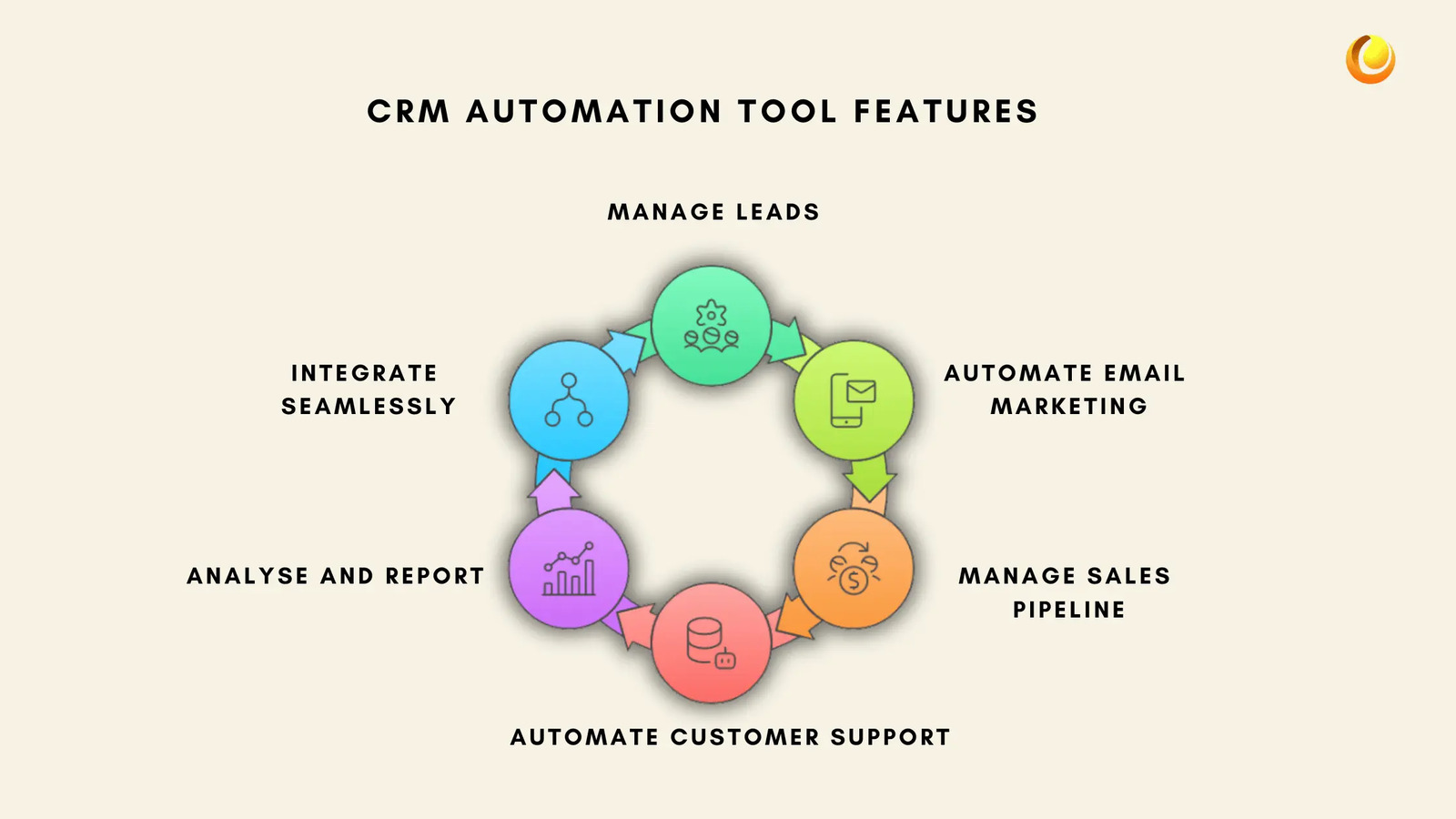
Lead and Contact Management: A robust CRM system should automatically capture, organise, and update lead and customer information. This ensures seamless communication and follow-ups, reducing the risk of missed opportunities and using web-to-lead techniques to get better quality leads.
Email Marketing Automation: The ability to schedule and personalise email campaigns based on customer behaviour is a must-have feature. Automated email sequences enhance engagement and boost conversions.
Sales Pipeline Management: Visual dashboards that provide real-time updates on deal progress, along with automated alerts and reminders, help sales teams prioritise tasks and close deals more efficiently.
Customer Support Automation: AI-powered chatbots, ticketing systems, and automated responses improve response times and customer satisfaction. These features ensure that customer queries are addressed promptly and effectively.
Advanced Analytics and Reporting: Data-driven decision-making is essential for business success. CRM analytics provide insights into sales performance, customer behaviour, and marketing effectiveness, enabling businesses to refine their strategies and achieve better results.
Integration Capabilities: A good CRM tool should integrate seamlessly with other business applications, such as email platforms, e-commerce systems, and social media tools. This ensures a unified approach to customer management and eliminates data silos.
There are a lot of things in CRM automation that you can utilise. For example, you can check our two other posts regarding how to use CRM for Sales Automation or maybe you like to explore the Phases of Successful CRM Implementation.
4. Top CRM Automation Tools Recommendations for Businesses in 2025
As CRM technology continues to evolve, businesses have access to a wide range of automation tools designed to meet their unique needs. Here are some of the leading CRM automation tools in 2025:
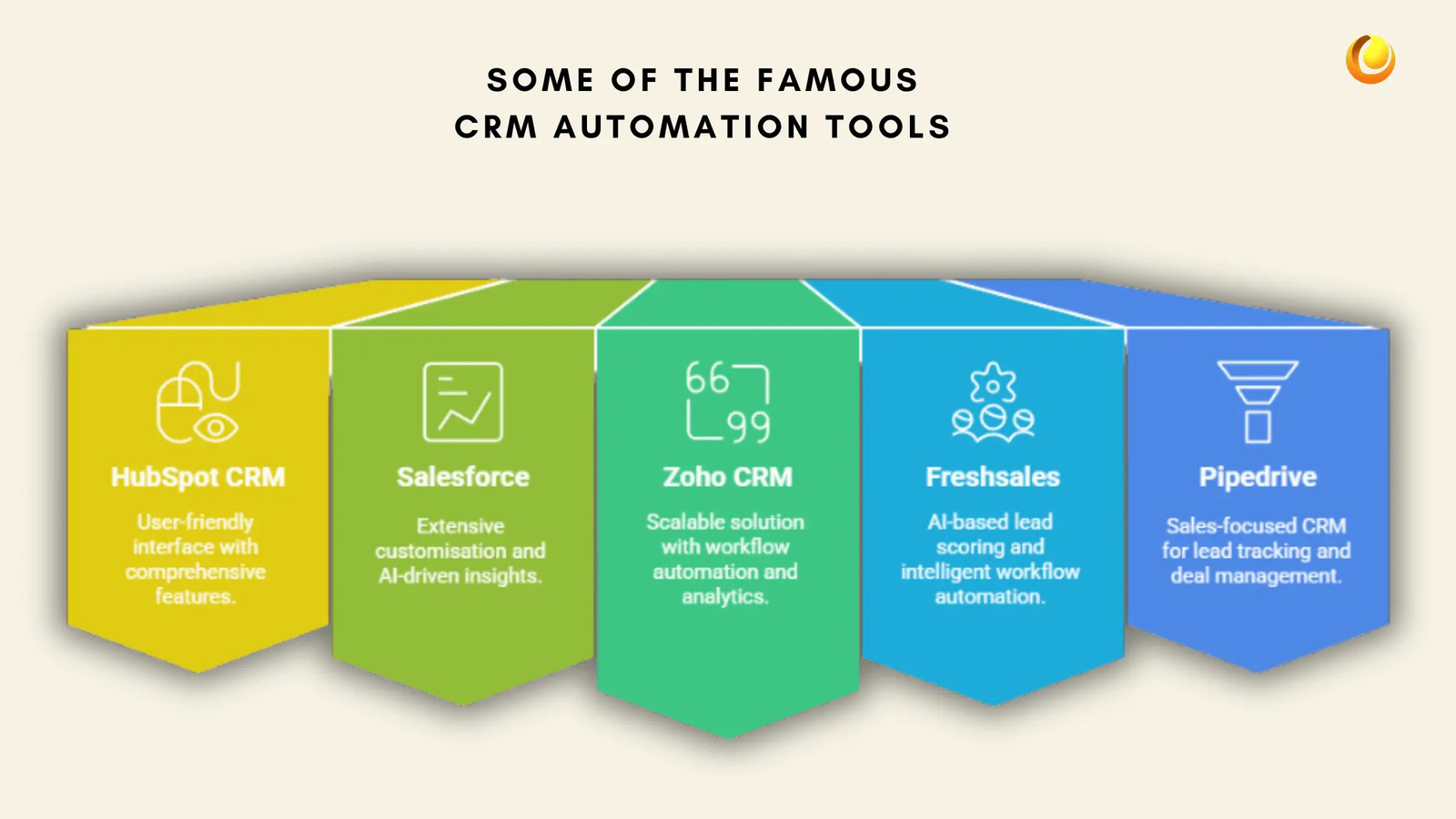
HubSpot CRM: Known for its user-friendly interface and comprehensive features, HubSpot CRM offers integrated marketing, sales, and customer service automation. It’s an excellent choice for small to medium-sized businesses.
Salesforce: Salesforce remains a top choice for enterprises due to its extensive customisation capabilities and AI-driven insights. Its Einstein AI platform provides advanced analytics and predictive insights, making it a powerful tool for large organisations.
Zoho CRM: Zoho CRM is a scalable solution that offers workflow automation, lead scoring and powerful analytics. It’s ideal for businesses looking for a cost-effective yet feature-rich CRM system.
Freshsales: Freshsales stands out for its AI-based lead scoring and intelligent workflow automation. It’s particularly well-suited for growing businesses that need a flexible and easy-to-use CRM solution.
Pipedrive: Pipedrive is a sales-focused CRM designed to streamline lead tracking and deal management. Its intuitive interface and automation features make it a favourite among sales teams.
When selecting a CRM automation tool, businesses should consider factors such as their size, industry, and specific needs to ensure they choose the right solution.
5. Implementing CRM Automation: Best Practices for Success
To maximise the benefits of CRM automation, businesses must follow best practices during implementation:
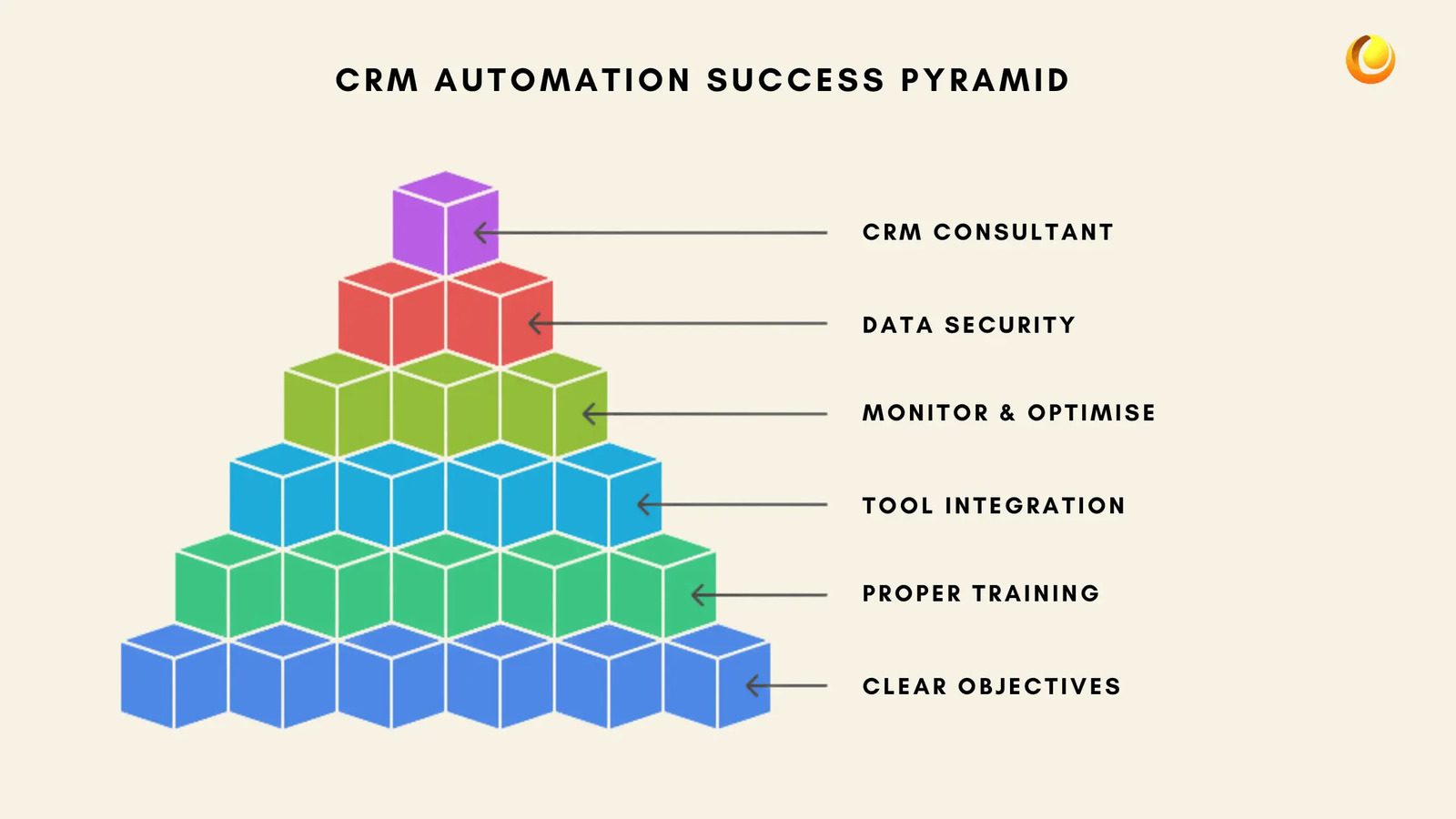
Define Clear Objectives: Before implementing CRM automation, identify your key goals. Whether it’s improving lead conversion, enhancing customer service, or optimising sales performance, having clear objectives will guide your strategy.
Provide Proper Training: CRM systems are only effective if your team knows how to use them. Invest in training to ensure seamless adoption and maximise the tool’s potential.
Integrate with Existing Tools: Ensure that your CRM system integrates seamlessly with your existing tools and platforms, such as email, e-commerce, and social media. This will create a unified ecosystem and eliminate data silos.
Continuously Monitor and Optimise: Regularly analyse CRM data to identify trends, adjust workflows, and improve automation processes. Continuous optimisation ensures that your CRM system evolves with your business needs.
Prioritise Data Security: With the increasing threat of data breaches, businesses must implement robust security measures to protect customer information. Choose a CRM system that offers advanced security features and complies with data protection regulations.
Hire a CRM Consultant: For better CRM automation, you can simply connect with experts like IT Solutions Solved. They will do all the heavy work for you. If you don’t build your team or have a CRM expert in your organisation then you should understand why your business needs a CRM consultant.
As technology continues to advance, CRM automation will play an even more critical role in shaping business success. AI-driven tools will enhance predictive analytics, automate complex workflows, and deliver hyper-personalised customer experiences. The rise of intelligent chatbots, virtual assistants, and AI-powered lead nurturing will redefine how businesses engage with their customers.
Investing in CRM automation today is not just a strategic move—it’s a necessity for businesses that want to remain competitive in the digital age. By leveraging the right tools and best practices, companies can enhance operational efficiency, deliver exceptional customer experiences, and drive long-term growth. The future of CRM automation is bright, and businesses that embrace this technology will be well-positioned to thrive in an increasingly dynamic and customer-centric world. If you want to implement to improve your CRM then just contact us, we will help you!





